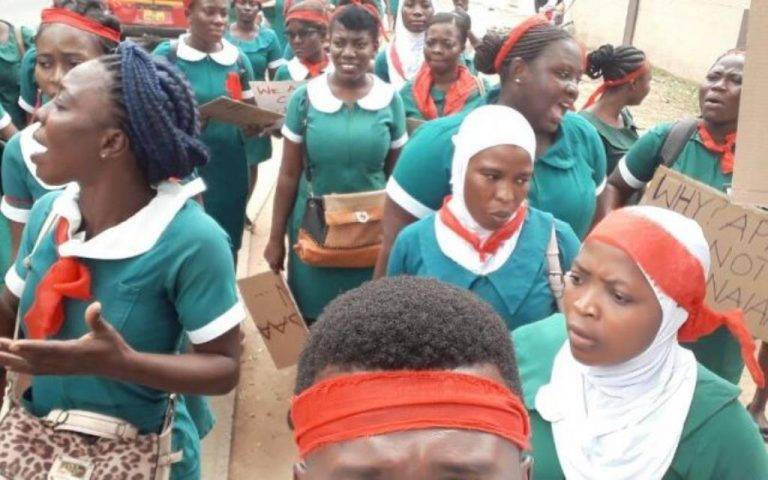Background to the Strike
Since 2nd June, 2025, the Ghana Registered Nurses and Midwives Association (GRNMA) declared a nationwide strike, which has since spread like wildfire across all regions of Ghana. The strike, guided by a clear roadmap, has significantly disrupted public healthcare services, leaving many vulnerable citizens without essential medical attention.
Despite numerous efforts by the Minister of Health to negotiate with the GRNMA, these attempts have proven unsuccessful. The striking Nurses and Midwives are demanding the implementation of their long-standing Conditions of Service.
Key Demands of the Nurses and Midwives
The GRNMA’s demands reflect a broader call for improved working conditions and equitable compensation. They include:
Book and Research Allowance for Tutors with PhDs and Master’s degrees in degree-awarding public health institutions. Uniform Allowance for all Nurses and Midwives in the public sector. Fuel Allowance for Principal Nursing/Midwifery Officers and above. Non-Basic Allowance of 8% of monthly basic salary for all Nurses and Midwives in the public sector. On-Call Facilitation Allowance of 5% of monthly basic salary for those working in understaffed facilities and required to exceed 8-hour workdays. Rural Incentive Allowance for public sector Nurses and Midwives in remote locations. 13th Month Allowance for all Nurses and Midwives in the public sector. Continuous Professional Development Support for all.
Why the Demands Are Justified
Nurses and Midwives are the backbone of the health sector, playing a critical role in Ghana’s journey toward Universal Health Coverage (UHC). From a health policy and financing standpoint, these demands are not only justified but necessary to retain a well-motivated and committed workforce.
Currently, the average monthly salary of Nurses and Midwives in Ghana ranges between GHS 2,500 – 4,000 (approximately $300 USD). In stark contrast, Ghanaian-trained Nurses who migrate to developed countries earn between $2,500 – $3,000 USD per month.
As Ghana transitions from a Low-Income Country to a Lower-Middle-Income Country, the expectations and cost of living have risen. It is, therefore, essential to adjust compensation and improve working conditions to reflect this new status.
Internal Inequities and Salary Disparities
There is also glaring disparity within Ghana’s own healthcare institutions. Health professionals in state-managed facilities like COCOBOD Clinic, GHAPOHA Clinic, Bank of Ghana Hospital, and VRA Hospital enjoy far superior conditions of service compared with that of their Counter-parts under the Ministry of Health and its Agencies.
This discrepancy fuels internal brain drain, where public sector professionals migrate to semi-autonomous institutions for better pay and benefits. The Fair Wages and Salaries Commission (FWSC) should urgently investigate these disparities and recommend corrective measures to harmonize compensation across the health sector.
Drivers of External Brain Drain
Extensive research confirms that poor remuneration and working conditions are driving skilled professionals out of Ghana. Recent studies include:
Adjei-Mensah (2023) – Factors influencing brain drain among health workers in Ghana. Amoo et al. (2024) – Outmigration of nurses from Ghana. Ibrahim et al. (2024) – Qualitative insights from nurse managers in Northern Ghana. Konlan et al. (2023) – A review of factors associated with nurse immigration in LMICs.
Common factors include:
Poor salaries and incentives Inadequate infrastructure and outdated technology Limited career development opportunities Suboptimal working conditions
These issues have led to mass migration of Nurses and Midwives to North America, Europe, Saudi Arabia, and the Caribbean.
According to Africa CDC (2025), Africa currently has 2.3 health professionals per 1,000 people, far below the WHO’s recommended 4.45. If unchecked, this trend could cripple Ghana’s health system.
Government’s Position and Budget Constraints
The Government has expressed willingness to implement the Conditions of Service but argues that immediate implementation would disrupt the 2025 national budget. The Health Minister has therefore proposed a deferral to 2026, which GRNMA has rejected.
This impasse reflects a deeper issue — the chronic underinvestment in Ghana’s health sector. More than 20 years after the Abuja Declaration, which mandates African Union member states to allocate at least 15% of their national budgets to health, only Rwanda, Botswana, and Cabo Verde have consistently met this target.
A Call to Action: Turning Crisis into Opportunity
This strike should not be viewed solely as a crisis. Instead, it presents a strategic opportunity for the new Health Minister, Hon. Kwabena Mintah Akandoh, to advocate for:
Increased budgetary allocation to the health sector Immediate and equitable implementation of Conditions of Service Long-term investment in healthcare infrastructure and human resources
By prioritizing the well-being of health professionals, the Government will not only address the current crisis but also build a resilient health system that can meet both present and future challenges.
By Alhaji Farouk Adam Iddrisu
Health Policy, Financing and Management Expert | Member, Association of Health Service Administrators – Ghana
References
Africa CDC (2025). Africa’s Health Financing in a New Era: Concept Paper. Kennedy Diema Konlan et al. (2023). The Factors That Are Associated with Nurse Immigration in Lower- and Middle-Income Countries: An Integrative Review. Mudasir Mohammed Ibrahim et al. (2024). Determinants and Mitigating Factors of Brain Drain among Ghanaian Nurses: A Qualitative Inquiry. Journal of Nursing Management. Wiley. Sarah Ama Amoo et al. (2024). To Stay or to Go? Outmigration of Nurses from Ghana. GPN Working Papers, Paper No. 4. Sussana Adjei-Mensah (2023). Factors Influencing Brain Drain among Health Workers in Ghana. European Journal of Human Resource. World Health Organization (2023). Global Health Expenditure Database. Geneva.


